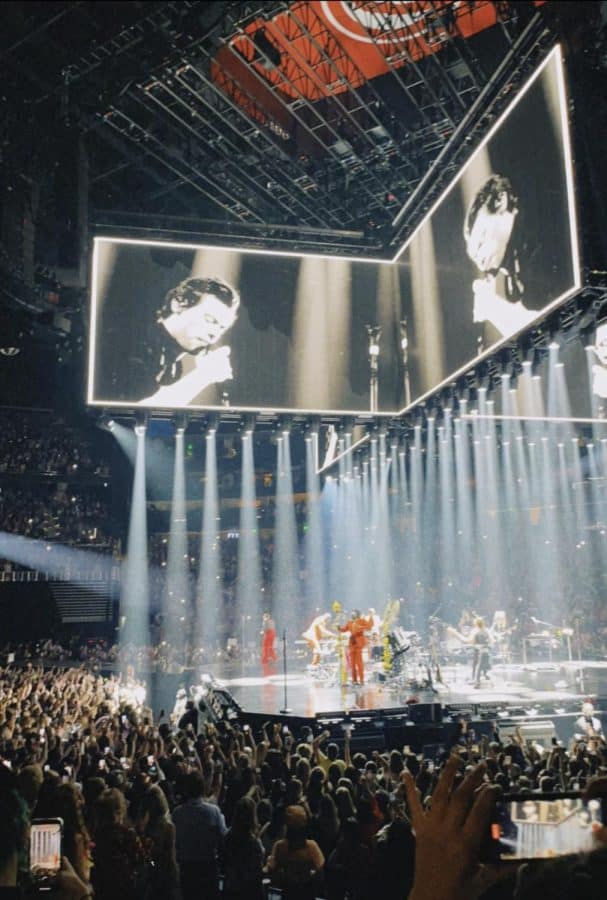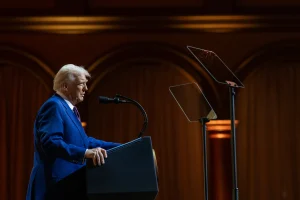How the music industry is becoming more eco-friendly
April 24, 2022
The pandemic forced large gatherings of people to take a back seat, or, more realistically, to leave the car altogether. Now, concert tickets are being bought like they are going out of style.
The large number of artists touring and musical festivals happening result in increased carbon emissions. UK researchers found that from a combination of five artists going on tour, 19,314 kilograms of carbon dioxide were added to the environment in only six months — the equivalent of taking 20 flights back and forth from London to New York City.
There has been a push in the music industry to be more sustainable on tours, especially from Billie Eilish, Harry Styles and Lorde. All three have partnered with REVERB, a nonprofit organization dedicated to making live music more eco-friendly. The nonprofit has “greened” over 250 tours.
The mission statement on REVERB’s website reads, “Uniting the music we love, tackling the environment and social issues we face, REVERB is a nonprofit dedicated to empowering millions of individuals to take action toward a better future for people and the planet.”
The organization has initiatives such as the opportunity to win items signed by the artists just for joining the mailing list.
Each venue that is partnered with REVERB sells reusable water bottles. With the purchase of a water bottle, fans donate money to the organization in the fight against climate change. Plastic straws were also banned from these venues, and water refill stations were placed around the concourse for an accessible and sustainable way to stay hydrated throughout the show.
Other efforts include implementing compost stations, hosting “action villages” for organizations and donating unused items such as toiletries.
Izzy Padilla, a UA junior majoring in news media, attended four of Harry Styles’ “Love on Tour” shows this past fall, where she said Styles encouraged fans to be environmentally conscious.
“There were reusable products such as eco-friendly tote bags and reusable water bottles,” Padilla said. “I personally love when artists make their concerts eco-friendly, because it shows that they care about such a huge problem the Earth is facing.”
Padilla said all tickets were mobile.
Live music is thought to be a large contributor to the climate crisis the Earth is facing today. Recent research suggests that it releases approximately 405,000 tons of greenhouse gases each year. Artist and fan transportation is thought to be the most environmentally taxing part of live music events.
Concerts are not the only music events that are beginning to take steps toward being more environmentally friendly. Music festivals, such as Coachella, are also taking the Earth’s health into consideration.
Massive generators are used to provide 24-hour electricity to the entire festival, powering sound systems, stage lights, vendor stands and recreation vehicles.
According to The Desert Sun, Coachella creates 107 tons of waste, with only 20% of that being recycled. The festival draws in approximately 125,000 music lovers from all over the world. Not to mention it takes place in a desert, which means a lot of plastic water bottles are used during the festival.
According to a study done at Yale University and George Mason University, the age demographic of those attending these festivals is the same as those who are most concerned about climate change.
The popular California festival is taking this into account. In 2020, Coachella announced that it would be taking steps to be more environmentally friendly, including the use of reusable water bottles to decrease the amount of plastic waste.
They implemented a new initiative for this year’s two-weekend event. Coachella announced its campaign called For Our Planet, a call to action to make the festival more eco-friendly. The goal that Coachella is trying to accomplish is “to account for our emissions, save water and divert waste.” For Our Planet is encouraging fans to shuttle and carpool to the festival and utilize the recycling bins that will be placed around the grounds.
Coachella’s For Our Planet has giveaways to motivate more fans to get involved in the project. “Carpoolchella” is rewarding fans who ride together to the event. The festival also rewards attendees for camping rather than traveling back and forth throughout the weekend. Some of the prizes include backstage passes and merchandise from the performers.
Coachella is partnering with Global Inheritance, a nonprofit organization that develops creative experiences that inspire individuals to take action on global environmental and social issues.
“We’ve partnered with Global Inheritance for over a decade now to develop environmental and educational programs to bring attention to global issues like climate change,” said Coachella’s mission statement.
Other festivals have also been moving toward sustainability. In 2017, Chicago’s Lollapalooza won Illinois’ Sustainability Award. It partners with REVERB and intertwines being eco-friendly with the importance of music.
In 2018, there were over 14.6 million tons of recycled materials, and the festival avoided plastic bottles with refillable water stations.
MJ Miller, a UA sophomore majoring in news media, said celebrity emphasis on sustainability motivates fans to show more concern for the environment.
“The last thing on everyone’s mind is recycling and taking care of their trash when they are at a show, so when the performer makes it a big deal, people will follow that lead and make it a big deal, too,” Miller said.
Questions? Email the culture desk at culture@thecrimsonwhite.com.





















